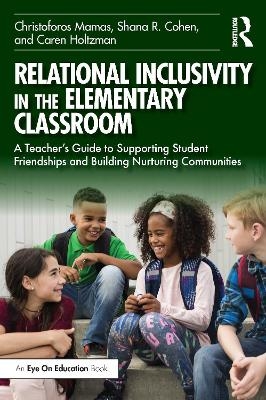
Relational Inclusivity in the Elementary Classroom
Routledge (Verlag)
978-1-032-49818-8 (ISBN)
Learn how to support and encourage the development of strong, nurturing relationships among your students of all neurotypes and needs with this practical, field-tested guide. Featuring classroom lessons, group activities, and a toolkit for creating social network maps specific to your classroom, this book shows teachers how to easily implement inclusive practices into their daily school routines. The book is anchored within a Research Practice Partnership that demonstrates how teachers can use simple research tools to gather real-time information about student relationships in their classrooms. Teachers can use this data to organize student groupings and plan classroom activities that support relational inclusivity. Moving beyond transactional approaches, like behavioral regulation and rule setting, this book prioritizes relationship building as vital to fostering inclusive classroom communities. It is key reading for in-service educators striving to create the kind of learning environment that meets the socio-emotional needs of all learners. Pre-service educators, educational researchers, and administrators can also use this helpful resource to support ongoing professional development that prioritizes a student’s sense of belonging and social emotional development in school.
Dr. Christoforos Mamas is a former elementary school teacher and is currently an assistant professor specializing in Transforming Special Education within the Department of Education Studies at the University of California, San Diego. His main research focus revolves around investigating the relational inclusivity of students identified as having special educational needs and disabilities in mainstream educational environments. Dr. Shana R. Cohen is a former early childhood educator and is currently an associate professor in the Education Studies Department at the University of California, San Diego. Her research examines immigrant families’ socialization processes in rearing their neurodiverse children. Her current work uses community engaged partnerships to develop sustainable pedagogical tools and interventions for multilingual and neurodiverse learners. Caren Holtzman is a former classroom teacher and retired faculty member in the Education Studies Department at the University of California. Her current work focuses on innovative programs that support the academic and social-emotional growth of traditionally marginalized students including newcomers and housing-insecure youth.
1. The Case for Relational Inclusivity Chapter 2. Research Practice Partnerships in Classrooms 3. The Social Network Analysis Toolkit 4. Who Are Your Friends? 5. Who Do You Play With At Recess? 6. Who Do You Go To For Help With Your Classwork? 7. Who Do You Talk To If You Are Having a Bad Day? 8. Moving Forward
| Erscheinungsdatum | 10.07.2024 |
|---|---|
| Zusatzinfo | 2 Tables, black and white; 16 Line drawings, black and white; 6 Halftones, black and white; 22 Illustrations, black and white |
| Verlagsort | London |
| Sprache | englisch |
| Maße | 152 x 229 mm |
| Gewicht | 226 g |
| Themenwelt | Schulbuch / Wörterbuch |
| Sozialwissenschaften ► Pädagogik ► Didaktik | |
| Sozialwissenschaften ► Pädagogik ► Vorschulpädagogik | |
| ISBN-10 | 1-032-49818-8 / 1032498188 |
| ISBN-13 | 978-1-032-49818-8 / 9781032498188 |
| Zustand | Neuware |
| Informationen gemäß Produktsicherheitsverordnung (GPSR) | |
| Haben Sie eine Frage zum Produkt? |
aus dem Bereich


